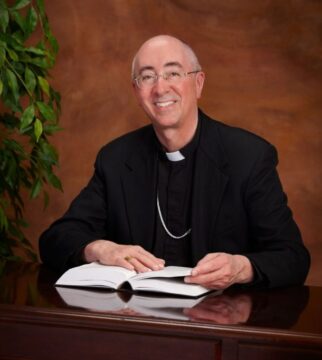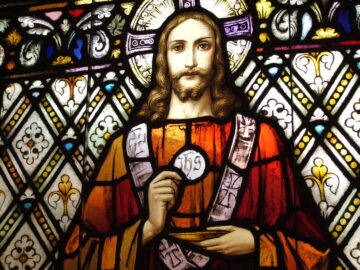Archdiocese of Milwaukee Auxiliary Bishop James Schuerman is the Franciscan Sisters of Christian Charity guest blogger. This is Part 2 of Sunday and the Banquet of the Lord. Read Part 1 here.
Sunday and Our Offerings
 The Sunday Mass is the Banquet of the Lord. We Catholics believe that Sunday Mass is the source and summit of our lives. The Vatican II Constitution on the Liturgy, Sacrosanctum Concilium speaks of the “full, active and conscious” participation of the faithful at Mass. (Sacrosanctum Concilium, 14)
The Sunday Mass is the Banquet of the Lord. We Catholics believe that Sunday Mass is the source and summit of our lives. The Vatican II Constitution on the Liturgy, Sacrosanctum Concilium speaks of the “full, active and conscious” participation of the faithful at Mass. (Sacrosanctum Concilium, 14)
At Mass, we bring our gifts to the altar. We bring the gifts that God has given us – bread, fruit of the earth and the work of our hands, and wine, fruit of the vine and the work of our hands. We bring these gifts to the altar that God may transform them into the Body and Blood of Christ.
We bring other gifts to the altar, as well – our lives. Our offerings include our happiness and our sadness, our joys and our sufferings.
 In the consecration of bread and wine, Jesus makes himself present. The Sacrament of the Eucharist makes present, at the same time, Christ’s saving death at Calvary and his glorious resurrection. The Eucharist is the true Body and Blood of Christ, who died to save us from our sins and rose to give us new life.
In the consecration of bread and wine, Jesus makes himself present. The Sacrament of the Eucharist makes present, at the same time, Christ’s saving death at Calvary and his glorious resurrection. The Eucharist is the true Body and Blood of Christ, who died to save us from our sins and rose to give us new life.
One thing that all human beings have in common is that we all suffer. Some suffer from physical, mental or spiritual sicknesses. Others suffer from broken relationships. Others grieve the loss of loved ones. We all suffer in some way.
In the Sunday Mass, our offerings include our sufferings. In the celebration of the Mass, we unite our sufferings with those of Christ Jesus. Jesus is the Servant of the Lord, about whom the prophet Isaiah prophesied. According to the Book of the Prophet Isaiah, the Servant of the Lord is the one who suffers voluntarily in order to establish justice in the world. He never acts violently, but rather accepts his suffering to redeem others. The innocent one suffers to save the sinners. Jesus came into the word to serve others. As we unite our sufferings to his at Mass, we learn to be servants of God and one another. (Photo: St. Paul Parish, Milwaukee, Wisconsin)
Sunday and the Sacrifice of Christ
Everything the Lord did for us, he did out of love. Jesus accepted his passion and death to liberate us from our sins.
Love has the power to motivate us to do extraordinary things. There are many stories of people motivated by love giving generously and making sacrifices. For example, there are many parents, who sacrifice their dreams and desires to secure a better life for their children. There are individuals, who have donated a kidney or bone marrow to save a family member. There are couples, who have made great efforts to change their attitudes and habits in order to save their marriages. Love can motivate us to do extraordinary things.
The night before he died on the cross, Jesus, who is the love of God incarnate, invited his friends to a celebration of Passover. Knowing that he was going to hand over his life to give life to the world, he shared his Body and Blood with them in the form of bread and wine. Motivated out of love, he gave himself to them, instructing them to celebrate this meal until he comes again.
 The Eucharistic Prayer at Mass commemorates the action of Jesus on the night before he died. He gave his disciples his Body and Blood in the form of bread and wine. In the part of the Eucharistic Prayer called the Anamnesis (“Memorial Act”), the people commemorate the saving death and resurrection of the Lord. The priest prays that the Holy Spirit comes to the people, in order that, as they receive the Body and Blood of Christ, they may become a living offering for God.
The Eucharistic Prayer at Mass commemorates the action of Jesus on the night before he died. He gave his disciples his Body and Blood in the form of bread and wine. In the part of the Eucharistic Prayer called the Anamnesis (“Memorial Act”), the people commemorate the saving death and resurrection of the Lord. The priest prays that the Holy Spirit comes to the people, in order that, as they receive the Body and Blood of Christ, they may become a living offering for God.
In one sense, becoming a living offering implies uniting our own sufferings with the sufferings of Christ. It is an act of faith, trusting that just as the cross was not the end of the story for Jesus, neither is it the end of the story for us. The love and mercy of God will prevail. In another sense, becoming a living offering means that we must dedicate ourselves to lives of service and self-giving love. Sunday is a day to dedicate our lives to the ways of Jesus, who came not to be served, but to serve.
Motivated out of love for his disciples, Jesus made himself the servant of all and washed the feet of his disciples. In this way, he taught them how to love others through service. He taught them how to be great by making themselves the least.
What can we do to share the love of God with others? Jesus gave us an example of love to help us. As members of the Church, we are called to collaborate with Christ sanctifying the world through the Sacraments and through service.


